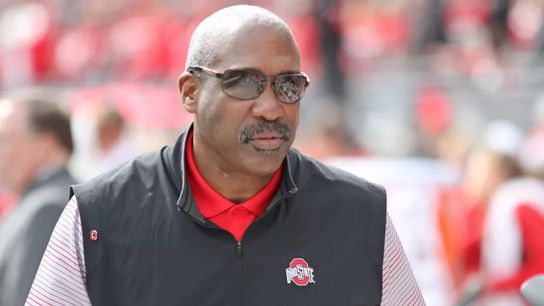As select leaders across college athletics continue to seek some semblance of uniform regulatory measures in the murky Name, Image and Likeness landscape, veteran Ohio State Athletics Director Gene Smith brought the Buckeyes’ collective viewpoint Thursday to Capitol Hill in Washington, D.C.
Testifying in front of the House Committee on Small Business, Smith both lauded NIL’s positive impacts on current student-athletes while he also implored the United States’ federal government to take action in the form of oversight.
“I significantly believe that NIL is beneficial to the student-athlete experience,” Smith said, “and it has been more successful than has been portrayed. …
“NIL is a great education tool that can allow student-athletes to learn a host of important entrepreneurial skills.”
Smith went on to tout that Ohio State has 420 student-athletes with at least one NIL deal; he did not specific what exact construct any of those deals represented.
However, Smith also noted that in sum Ohio State Buckeyes’ student-athletes have formed more than 2,000 NIL deals and that the school’s football team and women’s volleyball team had garnered the most opportunities.
But Smith also decried that prospective student-athletes and their parents/guardians now think nothing of “asking for $5,000 just to visit has become common.”
Smith then pointed out the divergent path between many collectives, initially formed under the guise of being non-profit entities but having later seen the IRS rule that the vast majority of collectives were not qualified for tax-exempt status, and college and university athletics departments.
“Collectives have formed with the intent of soliciting funds from passionate fans, and as a result of IRS interpretation, many collectives are shifting to Limited Liability Corporations,” Smith testified. “In many markets the efforts they are in (to raise funds) are in direct competition with athletic departments.
“While for sure beneficial to student-athletes in the short run, athletic directors are now finding themselves making funding decisions based upon declining income streams, which could in turn hurt our student-athletes in the future.
“Many states have created legislation to support their schools’ NIL activities, but there’s no uniformity to these state laws. As you all know, we do not have a federal law for NIL. However. protections need to be put in place. Like my colleague, I believe that Congress needs to enact NIL legislation as soon as possible.”
FootballScoop has sat in on multiple meetings at three different national meetings of college and university representatives where there has been both great discussion and concern about the long-range impact of NIL fundraising juxtaposed against school fund-raising; multiple athletics leaders, from department heads to senior-level assistant and associate athletics directors, have wondered aloud if NIL fundraising could ultimately cause athletics departments to not only trim budgets but potentially face eliminating sports, depending on the severity of declining fundraising numbers.
Smith shared his vision for an effective federal NIL law.
“An effective bill, in my opinion, should include a national NIL standard, NIL agent registration; (others) commented on the bad actors,” Smith said. “There’s great agents out there, but there are some unscrupulous characters who are taking advantage of young people. Standard NIL contracts, prohibition of inducements. The difference between athletics at our level and the pro sports is that we recruit; we do not draft. A draft makes it impossible for the bad actors to enter that space, like they do in our space.
“NIL public registry to bring transparency to the marketplace; no other industry doesn’t have a marketplace where you can actually evaluate other marketplaces and make good decisions as you move forward in your business. And strong enforcement measures.”
Smith’s appearance on Capitol Hill was one of many ongoing efforts to provide a more uniform NIL landscape. Earlier this summer, SEC Commissioner Greg Sankey, Alabama coach Nick Saban and other NIL regulatory advocates gathered in Washington, D.C. Notre Dame Athletics Director Jack Swarbrick also has met with legislators to discuss the need for standardized guidelines in the nebulous NIL arena.
